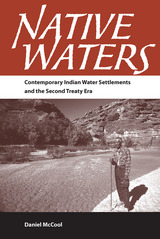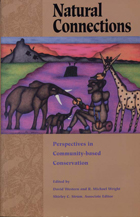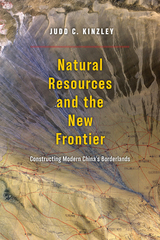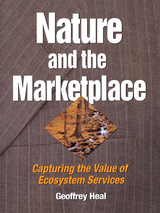8 start with N start with N



Both realism and justice demand that efforts to conserve biological diversity address human needs as well. The most promising hope of accomplishing such a goal lies in locally based conservation efforts -- an approach that seeks ways to make local communities the beneficiaries and custodians of conservation efforts.
Natural Connections focuses on rural societies and the conservation of biodiversity in rural areas. It represents the first systematic analysis of locally based efforts, and includes a comprehensive examination of cases from around the world where the community-based approach is used. The book provides:
- an overview of community-based conservation in the context of the debate over sustainable development, poverty, and environmental decline
- case studies from the developed and developing worlds -- Indonesia, Peru, Australia, Zimbabwe, Costa Rica, the United Kingdom -- that present detailed examples of the locally based approach to conservation
- a review of the principal issues arising from community-based programs
- an agenda for future action

Natural History of the Colorado Plateau and Great Basin provides an up-to-date summary of the region's geology, climates, and biology, including thorough treatments of the area's insects, fish, and reptiles. Also discussed are the ecology and distribution of prehistoric human cultures in the region; how modern humans have used (and abused) resources in the Intermountain West; and the impact of post-Pleistocene environmental changes on genetics of disjunct populations of conifer trees.
Written by a diverse group of acknowledged experts, Natural History of the Colorado Plateau and Great Basin offers invaluable background information for all students and resource managers who want to work in or visit the Intermountain West.

China’s westernmost province of Xinjiang has experienced escalating cycles of violence, interethnic strife, and state repression since the 1990s. In their search for the roots of these growing tensions, scholars have tended to focus on ethnic clashes and political disputes. In Natural Resources and the New Frontier, historian Judd C. Kinzley takes a different approach—one that works from the ground up to explore the infrastructural and material foundation of state power in the region.
As Kinzley argues, Xinjiang’s role in producing various natural resources for regional powers has been an important but largely overlooked factor in fueling unrest. He carefully traces the buildup to this unstable situation over the course of the twentieth century by focusing on the shifting priorities of Chinese, Soviet, and provincial officials regarding the production of various resources, including gold, furs, and oil among others. Through his archival work, Kinzley offers a new way of viewing Xinjiang that will shape the conversation about this important region and offer a model for understanding the development of other frontier zones in China as well as across the global south.

Natural Resources for the 21st Century is an in-depth assessment by natural resource experts that offers a reliable status report on water, croplands, soil, forests, wetlands, rangelands, fisheries, wildlife, and wilderness.

In recent years, scientists have begun to focus on the idea that healthy, functioning ecosystems provide essential services to human populations, ranging from water purification to food and medicine to climate regulation. Lacking a healthy environment, these services would have to be provided through mechanical means, at a tremendous economic and social cost.
Nature and the Marketplace examines the controversial proposition that markets should be designed to capture the value of those services. Written by an economist with a background in business, it evaluates the real prospects for various of nature's marketable services to “turn profits” at levels that exceed the profits expected from alternative, ecologically destructive, business activities. The author:
- describes the infrastructure that natural systems provide, how we depend on it, and how we are affecting it
- explains the market mechanism and how it can lead to more efficient resource use
- looks at key economic activities -- such as ecotourism, bioprospecting, and carbon sequestration -- where market forces can provide incentives for conservation
- examines policy options other than the market, such as pollution credits and mitigation banking
- considers the issue of sustainability and equity between generations
Nature and the Marketplace presents an accessible introduction to the concept of ecosystem services and the economics of the environment. It offers a clear assessment of how market approaches can be used to protect the environment, and illustrates that with a number of cases in which the value of ecosystems has actually been captured by markets.
The book offers a straightforward business economic analysis of conservation issues, eschewing romantic notions about ecosystem preservation in favor of real-world economic solutions. It will be an eye-opening work for professionals, students, and scholars in conservation biology, ecology, environmental economics, environmental policy, and related fields.

While overconsumption by the developed world's roughly one billion inhabitants is an abiding problem, another one billion increasingly affluent "new consumers" in developing countries will place additional strains on the earth's resources, argue authors Norman Myers and Jennifer Kent in this important new book.
The New Consumers examines the environmental impacts of this increased consumption, with particular focus on two commodities -- cars and meat -- that stand to have the most far-reaching effects. It analyzes consumption patterns in a number of different countries, with special emphasis on China and India (whose surging economies, as well as their large populations, are likely to account for exceptional growth in humanity's ecological footprint), and surveys big-picture issues such as the globalization of economies, consumer goods, and lifestyles. Ultimately, according to the orman Myers and Jennifer Kent, the challenge will be for all of humanity to transition to sustainable levels of consumption, for it is unrealistic to expect "new" consumers not to aspire to be like the "old" ones.
Cogent in its analysis, The New Consumers issues a timely warning of a major and developing environmental trend, and suggests valuable strategies for ameliorating its effects.
READERS
Browse our collection.
PUBLISHERS
See BiblioVault's publisher services.
STUDENT SERVICES
Files for college accessibility offices.
UChicago Accessibility Resources
home | accessibility | search | about | contact us
BiblioVault ® 2001 - 2024
The University of Chicago Press









